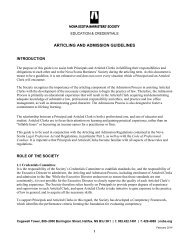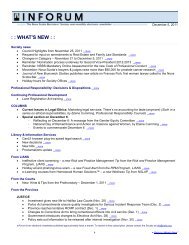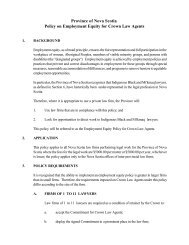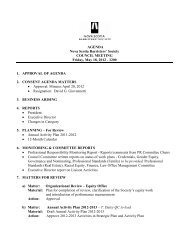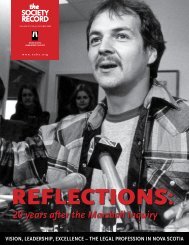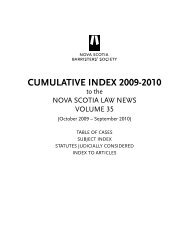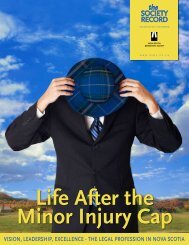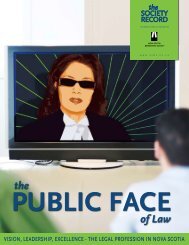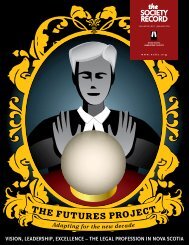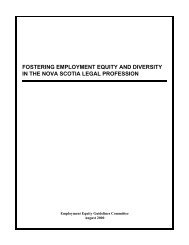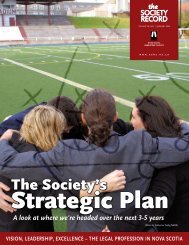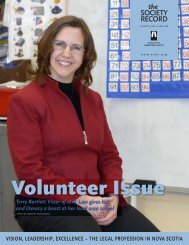SR Vol 25 No 1, January 2007 - Nova Scotia Barristers' Society
SR Vol 25 No 1, January 2007 - Nova Scotia Barristers' Society
SR Vol 25 No 1, January 2007 - Nova Scotia Barristers' Society
Create successful ePaper yourself
Turn your PDF publications into a flip-book with our unique Google optimized e-Paper software.
Warner pointed out in Kemp v. Prescesky, [2006] N.S.J. <strong>No</strong>. 174;2006 NSSC 122 (S.C.) that the current Act gives an adjudicatorno power to set aside a judgment obtained after a hearing inthe defendant’s absence where no defence was filed – even if thedefendant’s failure to appear was due to error or inadvertence.Similar sorts of procedures are seen in the other Canadian jurisdictionswith $<strong>25</strong>,000 limits. The bottom line: in monetary terms, our SmallClaims Court has graduated from ten-speed to motorcycle. It’s timethe Court’s procedures followed suit.A :monetary jurisdiction of the Court are adjudicatedThe purpose of the Small Claims Court is to providea forum “wherein claims up to but not exceeding theinformally and inexpensively but in accordance withestablished principles of law and natural justice.” The purpose andintent of the Act would be undermined, if not defeated, by proceduralroadblocks. The principle of natural justice can safely be relied uponto ensure a fair hearing, no matter what the stakes. In my view, theinformality of the Court, enhanced by the overriding principles ofnatural justice, provide a forum with the flexibility to respond to theneeds of the litigants and to the situation at hand, neither of which isdefined exclusively by the amount of money involved.Some would argue that the application of the principles of law andnatural justice cloak the Small Claims adjudicators with the abilityto order pre-hearing disclosure. I believe that in a court governed byprinciples of natural justice, the adjudicator is in a position to do whatneeds to be done to ensure procedural fairness. What needs to bedone will be case specific and may include things such as pre-hearingdisclosure. In 2003, Justice Scanlan stated that there is “no requirementfor a claimant or defendant to make all relevant documents available tothe opposing party prior to trial. If this is done, in part or in full, it is ona purely voluntary basis.” (MacEwan v. Henderson 2003 NSSC 120.)I do not believe that Justice Scanlan’s accurate observation precludesan adjudicator from ordering disclosure, as it had not been orderedby the adjudicator in the caseupon which Justice Scanlanwas commenting. Further, thecomment was made prior toMary Jane McGintyMcGinty McCleavethe increase in the Court’s monetary jurisdiction. As Justice Warnerpointed out in Kemp v. Prescesky 2006 CarswellNS 175 , “...therequirements for natural justice in the Small Claims Court system haveincreased with the increase in the monetary jurisdiction of the Court.”The informality of the Court is of great value and it should onlybe compromised when the circumstances warrant more formalprocedures. A blanket compromise of the Court’s informality isbound to inhibit accessibility and increase expense. I doubt there isa seasoned litigator who has not experienced the frustration of theopposition’s abuse of procedural “safeguards” to prolong and increasethe expense of the litigation. It would be a great loss to the system ifthis were possible in Small Claims Court.The Court of Appeal gave some valuable guidance last month inAttorney General of <strong>No</strong>va <strong>Scotia</strong> v. Stewart Bishop 2006 NSCA 114.The <strong>No</strong>va <strong>Scotia</strong> Utility and Review Board ordered discovery of theAttorney General’s expert in an expropriation case. The AttorneyGeneral appealed the decision of the Board, stating that the Boardhad no authority to order discoveries. The Court of Appeal held firstlythat discoveries are procedural in nature rather than substantive and,<strong>January</strong> <strong>2007</strong> 33



